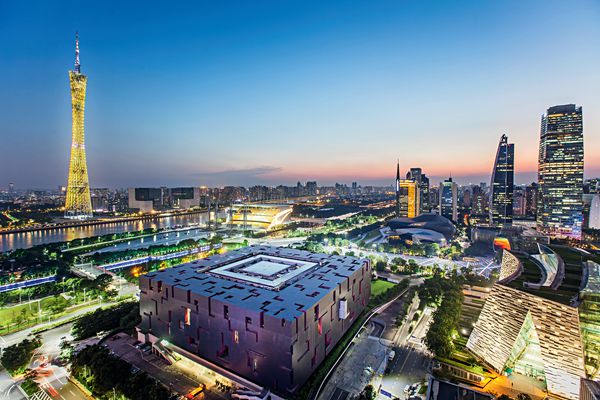Guangzhou: Cantonese culture and dim sum heaven
 0 Comment(s)
0 Comment(s) Print
Print E-mail China Today, December 9, 2016
E-mail China Today, December 9, 2016
Located in the middle south of Guangdong Province, Guangzhou, the provincial capital, is among China’s top three most developed metropolises, the other two Beijing and Shanghai.
Guangzhou has throughout its 2,200-year history been the political, military, economic, and cultural focal point of South China. As a hub of Cantonese culture that evolved within the area encompassing Guangzhou and the Pearl River Delta, Guangzhou is distinct for its traditions and folkways.
|
A glittering night view of the Canton Tower and Zhujiang New Town taken on September 13, 2016. |
The cultural legacy of the city’s 2,200-year civilization is manifest in all facets of daily life, in particular Guangzhou’s cuisine, architecture, commerce and trade, as well as the local dialect, etiquette, art, and frequent festivals. Guangzhou sustains with ease the high reputation that is rooted in its many cultural assets.
Core Region of Lingnan Culture
Lingnan, literally south of ridges, refers to three provincial regions south of Wuling Ridges – Guangdong, Guangxi, and Hainan, all of which are seats of the Lingnan culture. Guangzhou is the most prominent city by virtue of its striking characteristics and wide influence.
Guangzhou has been known during its history, which goes all the way back to the Qin Dynasty (221-206 BC), as Nanhai Prefecture, Panyu, and Guangzhou Area Command. It has always been an administrative center.
Around AD 330, Guangzhou became a major port along the Maritime Silk Road, and also China’s sole foreign trade port. Owing to its frontier location, Guangzhou was never at center stage of Chinese history, a fact that has more clearly defined its local features.
In earlier times, people living in the Central Plains would head south to escape the wars and turmoil that so frequently erupted there. These newcomers gradually infused and enriched Lingnan Culture with that of the Central Plains. Guangzhou’s distinct character gradually took shape in this process of blending and evolvement to eventually become a center of the Lingnan Culture.
After the First Opium War (1840-1842), Guangzhou advanced from a mere border town to the forefront of China’s interchanges with Western countries. Guangzhou’s unique culture, characterized by global vision with a commercial focus, is the result of a blending of the Orient with the West. Its consequent openness, pragmatism, and inclusiveness are what make Guangzhou so distinct.
This communication, collision, and intermingling made Lingnan Culture foremost in modern China’s politics and ideology, as well as the country’s revolutionary and cultural development.
Guangzhou is the cradle of China’s national industry. The country’s modern military industry and civil industry, established during the Westernization Movement of the latter half of 19th century, were distributed throughout Southeast China’s coastal areas. Guangzhou Machine Bureau was the first Westernized enterprise in Guangdong Province.
The city also witnessed the planning of modern China’s democratic politics. Prominent political thinker and reformer Kang Youwei (1858-1927) founded the modern school in Guangzhou called Wanmu Caotang. There he disseminated his thoughts on constitutional reform and modernization.
Revolutionists Sun Yat-sen and Huang Xing launched an armed uprising in Guangzhou in 1911, their aim to overthrow the Qing Dynasty and establish a bourgeois republic. Despite its failure, the Lingnan Culture, with Guangzhou as the core, was a driving force of modern China’s political reform.
Over the past decades, Guangdong has been at the forefront of China’s reform and opening-up. For example, Baoan, a county under the administration of Guangzhou, was renamed Shenzhen City, and so became China’s first special economic zone in 1980. Meanwhile the Pearl River Delta took the lead in China’s opening-up, so acting as an archetype of China’s economic development.







Go to Forum >>0 Comment(s)